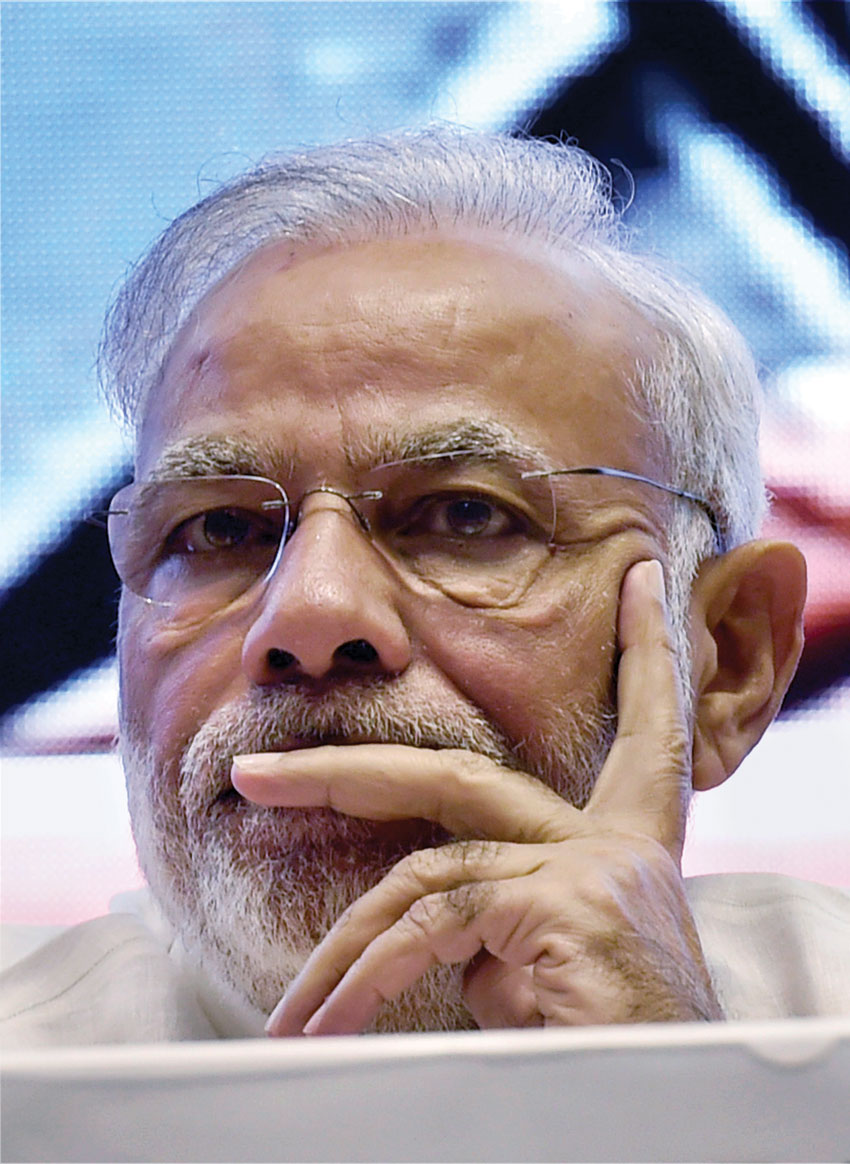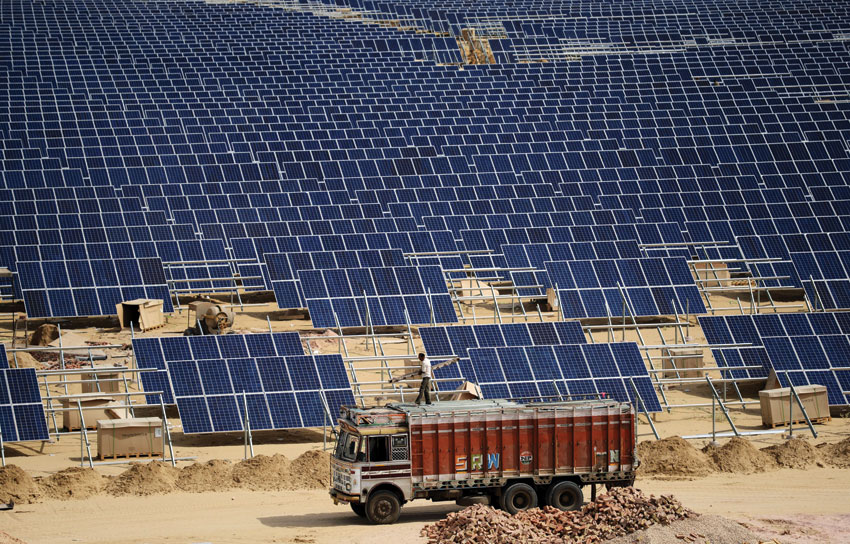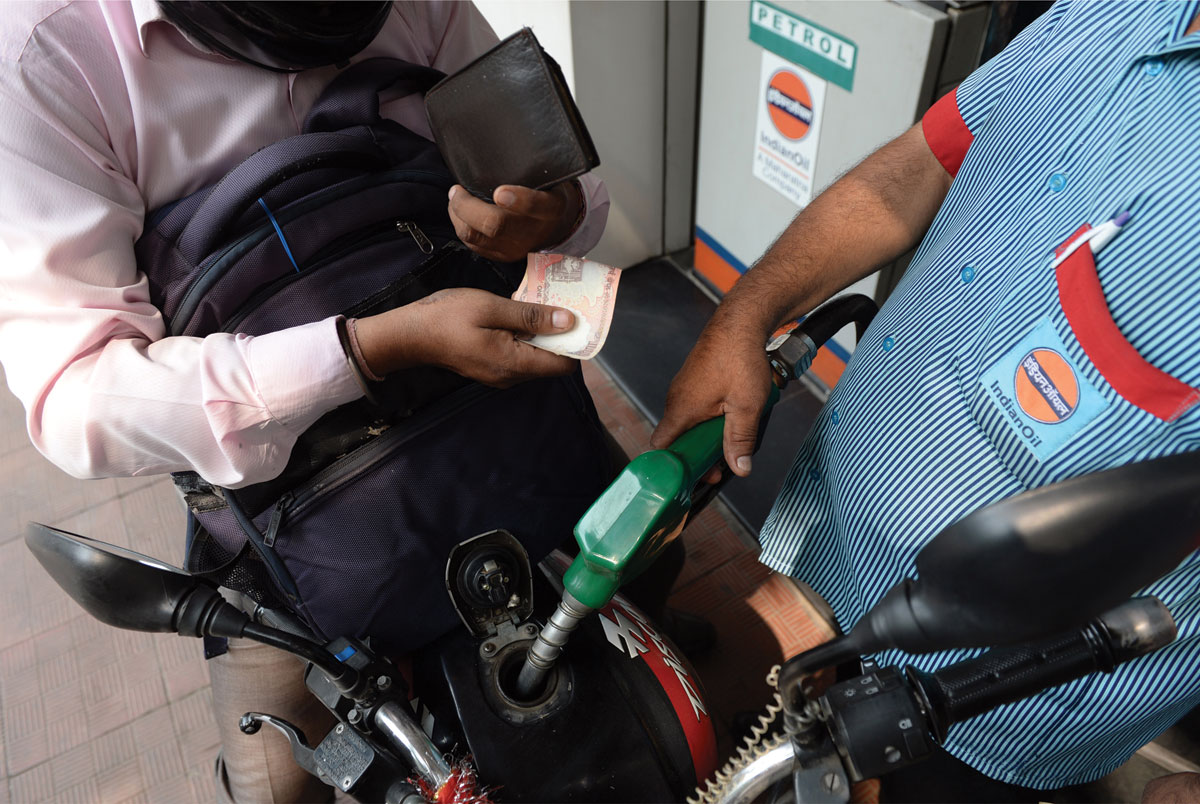MODI RIDES ON LOW INFLATION RATES
A fuel pump employee fills a motorcycle with gas at a service station in New Delhi, Sept. 29. (Prakash Singh/AFP/Getty Images)
There is an opinion that Prime Minister Narendra Modi has been lucky as the global oil prices crashed around the time he assumed charge. This has had an impact on inflation given India’s overwhelming dependence on imported oil and gas. The common man in India is known to endure several hardships. The electorate, however, invariably has a virulent reaction if prices are not under control, writes Siddharth Srivastava. – @Siliconeer #Siliconeer #narendramodi #narendramodi @namo #namo #inflation #India
It hits them the hardest. This, perhaps, is an important reason that Modi’s approval ratings continue to be very high, with no close contender at second place. Earlier this month the IMF praised the government for targeting 4% inflation for the next five years. Apart from the fall in hydrocarbon rates, economists have been saying that some deft policy moves, including handling of food shortages, have also helped keep prices under control.
In a recent assessment on inflation, Sajjid Z. Chinoy, chief India economist, JP Morgan, said, “We find the disinflation appears much more durable as expectations have begun to moderate, and Indian policymakers, in Delhi and Mumbai, deserve far more credit than they often get.”

Seen as one of Modi government’s most visible macroeconomic successes over the last three years, there has been a persistent moderation of consumer price index (CPI) inflation. CPI averaged 9.5% for six years between 2007 and 2013 when the New Delhi government was headed by Prime Minister Manmohan Singh. For the last 30 months it has averaged 6%, despite drought conditions.
According to latest official figures, India’s CPI fell to a five-month low in August due to smaller rises in food prices that impacts the poor the most. Explaining the easing of retail inflation, economic affairs secretary Shaktikanta Das said, “The earlier rise of inflation was on account of rise in price of pulses and vegetables. Now there has been a significant moderation. That explains the inflation coming down to 5%.”
Das said future price increases are expected to remain in a moderate zone, which could prompt the Reserve Bank of India to cut interest rates that will provide a big boost to economic growth and investments. “There is a direct relationship between inflation figures and policy rates of the RBI. So, inflation has moderated as expected. I would therefore expect RBI to take this into consideration and take its call. I’m sure they will consider all aspects and take a call,” Das told reporters.
Modi Luck. There are, of course, those who continue to believe that the Modi got lucky due to the oil and gas price crash. Well, there seems to be more good fortune round the corner and it relates to the Modi’s big push to make renewable energy, in particular solar power, one of the cornerstones of India’s electricity generation sector.

Over the recent months there have been fears that some developers may have bid too low for solar projects, making them unviable. This month, Antoine Cahuzac, CEO, EDF Energies, part of the French state-run power major EDF Group, cautioned that companies that make unreasonable bids and are unable to deliver solar projects in India and elsewhere, should be penalized by the government. Cahuzac warned developers are bidding very low rates for solar projects hoping technology will improve in future due to which costs will decline.
“When these bets go wrong, projects get into problems. What we are seeing in every country and what we are telling every government is that you should make such rules while floating tenders that developers are forced to build. If they don’t, they should have to feel the pain.” EDF Group is betting big on India’s renewable energy space. The company has plans to set up 2,000 MW of power projects needing investment of $2 billion.
However, it seems Cahuzac has spoken too soon and may have to re-think his words. In a report this month, renewable energy-focused consulting firm Bridge to India (BTI) has said landed solar module prices in India have crashed by 15% to $0.36/Wp over the last three months due to global over supply and sharp fall in price of raw material polysilicon in China, “Polysilicon prices have dropped 30% in a month, wafer prices by 20% and similar reductions are seen across the value chain. Landed module prices in India have dropped by nearly 15%,” the BTI report said, adding supply glut could continue for more than a year. Polysilicon is the main ingredient in making solar cells, while wafer is an important raw material to make solar panels. BTI said Indian solar project developers stand to benefit due to the price drop. “Tariff bids that seemed aggressive in past now seem very attractive. For example, projects with tariffs of Rs 5.17-5.72/unit for 2,000 MW tender in Telangana, completed in August 2015 when module prices were about $0.45/Wp, will be procuring modules at current prices and will see substantial jump in returns,” the solar tracking agency said.
Luck, it seems, is siding with the Modi dispensation when it relates to the all-important matter of inflationary pressures.


